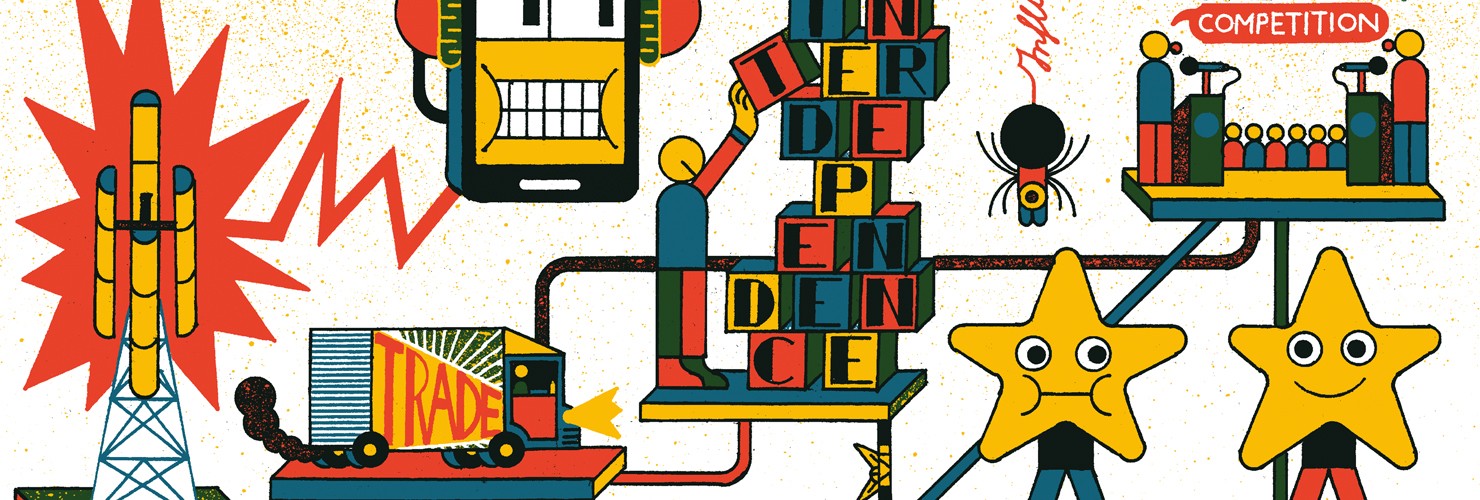

Towards a "Principles First Approach" in Europe's China Policy
Drawing lessons from the Covid-19 crisis
Edited by Mikko Huotari, Jan Weidenfeld and Claudia Wessling
2020 was meant to be the year in which decisive progress was made in EU-China relations. It all came different: The coronavirus pandemic has exposed growing tensions in EU-China relations and served as a wake-up call for European decision makers and wider publics of their deep interdependence with China and of the resulting vulnerabilities. At the same time, China’s National Security Law in Hong Kong and human rights violations in Xinjiang have further increased tensions.
MERICS' analysts have made the ongoing shifts in EU China policy the focus of the the latest MERICS Paper on China "Towards a ‘principles first approach’ in Europe China policy – Drawing lessons from the Covid-19 crisis”. They conclude, among others, that current developments in EU China relations are a culmination of trends that have been visible for some time: “Disillusionment with China has been growing across Europe for years, as policy makers and negotiators have found it increasingly difficult to find common ground with Chinese counterparts.”
You can read this MERICS Paper on China online below or download a PDF version here:
Introduction: Pursuing a principles-first approach in EU China policy (Mikko Huotari and Jan Weidenfeld)
European China policy needs to be grounded in a sober recognition of China’s frequent and sustained non-convergence with principles, values and best practices that underpin the European project and liberal-democratic market economies in the OECD world. Effective EU China policy will require swifter and more decisive leadership, and the creation of ad-hoc coalitions that are able to advance decisions quickly. Read more
Key graphics: Mapping EU-China interdependencies
The EU, its member states and China entertain close relations on different levels of politics, the economy and society. Explore our graphics chapter to learn more about EU-China relations, economic interdependencies and risky interconnectedness. Read more
PART I: RESILIENCE
Chapter 1: Protecting the EU’s political sovereignty and unity (Lucrezia Poggetti)
The Chinese party state is firmly intent on shaping public opinion and decision making in the EU. Critical challenges for Europe include the spread of Chinese propaganda and disinformation in Europe, the capture of elites who act as opinion shapers within European society, and self-censorship by those who shape European public perceptions of China. Read more
Chapter 2: Safe interdependence: Managing economic vulnerabilities (Caroline Meinhardt)
The supply chain disruptions caused by Covid-19 and the severity of their impact on Europeans’ health and livelihood have heightened existing concerns about Europe’s economic dependence on China. At the same time, China is increasingly leveraging its importance as a supplier of sought-after goods for economic coercion by means of threats and retaliation. Europe therefore has to systematically reassess its interdependencies. Read more
PART 2: COMPETITIVE LIBERALISM
Chapter 3: Competing with China in the digital age (Rebecca Arcesati)
For Europe, economic competition with China is increasingly playing out in the digital domain and new technologies. Policymakers have begun to address China’s drive towards self-reliance and global leadership in key technologies. Going forward they will have to integrate previously marginal issues, such as the use of foreign research collaboration as an industrial policy tool and China’s standardization strategy for ICT and emerging technologies. Read more
Chapter 4: Advancing liberal multilateralism (Mikko Huotari and Katja Drinhausen)
Liberal multilateralism will not survive 2020 unscathed –a key reason being China’s corrosive impact. Despite Beijing’s claims to be a standard-bearer for global multilateralism, China’s actual approach is likely to clash more frequently and in more fundamental ways with OECD principles and European interests. Beijing might recognize multilateral forums as valuable tools, but it does not accept the validity of universal rules and principles imposed on nations. Read more
Part 3: GLOBAL INFLUENCE
Chapter 5: Delivering Global Public Goods (Nis Grünberg and Thomas des Garets Geddes)
The EU will increasingly find that China is eager to shape the provision of Global Public Goods (GPGs). As the largest emitter of CO2, Beijing needs to take on bigger responsibilities in global climate action. On questions of global health and climate, cooperation with China will, however, be hampered and frustrating given growing distrust in other arenas, shifting domestic priorities, global power politics and political differences. Read more
Chapter 6: Engaging in effective geopolitical competition (Helena Legarda)
The coronavirus pandemic has provided Beijing with an opportunity to further expose and exploit vulnerabilities in the already strained Western-dominated global order. In the upcoming years, China will pose challenges to Europe in the Western Balkans and the MENA region, the Indo-Pacific, and increasingly in the Arctic. The EU must limit China’s geopolitical drive where necessary and contain it where possible while seizing opportunities that shape Chinese behavior. Read more
This study was presented at the hybrid MERICS conference “Charting a new course for European China Policy: Resilient, Competitive and Geopolitical”, which was held on September 16. A number of sessions can be re-watched here.
Editorial team: Claudia Wessling, Director Publications, MERICS, Janet Anderson, Freelance editor
Graphics: Alexandra Hinrichs, Graphic designer, MERICS
Header illustration: Anton Ohlow









